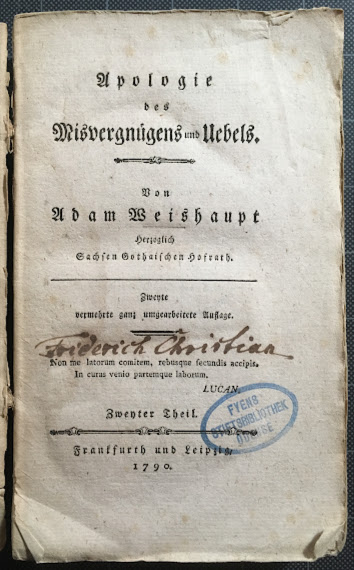What I am sharing here is the title page of a little treasure from my personal library: the second edition of the second volume of Weishaupt's Apology of Discontent and Dissatisfaction (1790) a rather tedious (by modern standards; the readers of the eighteenth century were made of hardier stuff) dialogue about religion, philosophy, social change, and the meaning of life: at 366 pages. The book is unbound and remains in its worn blue interim paper wrapper, as issued.
Friedrich Christian reigned as Duke of Schleswig-Holstein-Sonderburg-Augustenburg from 1794 until his death in 1814. The stamp of the famous Fyens (=Funen) Diocesan Library of Odense appears on the title page and inside cover, and a manuscript note on the latter indicates the book passed to that institution in 1816.
Created in 1813, the library reflected the theological needs of the clergy but was dedicated to "maintaining the scientific spirit and increasing the sum of knowledge for anybody in the province who loves science." By the 1830s, the Citizen's Library operated out of the same building. In the course of the twentieth century, the collection was merged first with that of the Odense Central Library and then the Library of the University of Southern Denmark.
The theological volumes (3,000 out of the total collection of 30,000) passed to the Library of Fuller Theological Seminary in 1948. (This volume appears in the 1902 catalogue under the category of Christian Morality, subheading Mixed Moral Writings.)
* * *


No comments:
Post a Comment